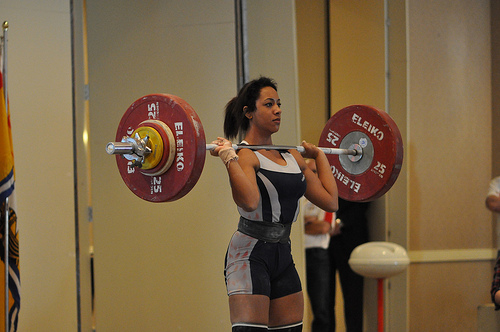
Weightlifting Is Just For Men - Women Should Avoid It
It's easy to see where this idea comes from. For many men who lift, their training is intrinsically masculine, and from high school bros bragging about their bench to adult men comparing their lifts with their friends around the barbecue, it's a male topic of conversation. Additionally, weightlifting tends to 'masculinize' men - they get more muscular, stronger and leaner, and can produce more testosterone too! But the key benefits of weightlifting aren't huge arms and a neck that's thicker than your head; they're found in core strength and stability, increased muscle mass and greater strength in the hips and legs, as well as metabolic effects. Women can benefit from weightlifting just as much as men in this regard, and it's women, not men, who suffer most from osteoporosis (brittle bones) in later life, something weightlifting can help prevent. When women consider weightlifting, the thing that puts them off is the idea of its 'masculinizing' effects. Most women don't want to look more like a man. But if you're a woman and you lift, you'll look like a fit woman, not like a man. Men produce somewhere around 10 times as much testosterone as women; their hormonal chemistry is very...
It's easy to see where this idea comes from. For many men who lift, their training is intrinsically masculine, and from high school bros bragging about their bench to adult men comparing their lifts with their friends around the barbecue, it's a male topic of conversation. Additionally, weightlifting tends to 'masculinize' men - they get more muscular, stronger and leaner, and can produce more testosterone too! But the key benefits of weightlifting aren't huge arms and a neck that's thicker than your head; they're found in core strength and stability, increased muscle mass and greater strength in the hips and legs, as well as metabolic effects. Women can benefit from weightlifting just as much as men in this regard, and it's women, not men, who suffer most from osteoporosis (brittle bones) in later life, something weightlifting can help prevent. When women consider weightlifting, the thing that puts them off is the idea of its 'masculinizing' effects. Most women don't want to look more like a man. But if you're a woman and you lift, you'll look like a fit woman, not like a man. Men produce somewhere around 10 times as much testosterone as women; their hormonal chemistry is very different and that's what determines the typical male response to weight training. And ladies can take heart from a fact that a lot of male lifters find extremely frustrating: an extra, say, 10 pounds of muscle, evenly distributed across your body, is pretty much invisible anyway.

Women Should Lift Only Light Weights
This is another piece of gender stereotyping: big barbells for the men, little pink dumbbells for the ladies. As a result, not only are guys blowing their rotator cuffs out doing their prehab work with outsized weights in case people think they're a girl or something, but women are afraid to really train. Yet, training with heavy weights is proven to be a great way to increase strength, stability and even mobility and flexibility! In later life, after the menopause, women can suffer from osteoporosis, or brittle bones. Bones can be made denser in response to mechanical stress. In other words, if you want denser bones, you should put your bones under pressure, and lifting heavy weights is a good way to achieve this. Building up bone density now will protect you against osteoporosis down the line.
- Important notification about information and brand names used in this slideshow!
- Photo courtesy of Richard Foster by Flickr : www.flickr.com/photos/93963757@N05/8552318056/
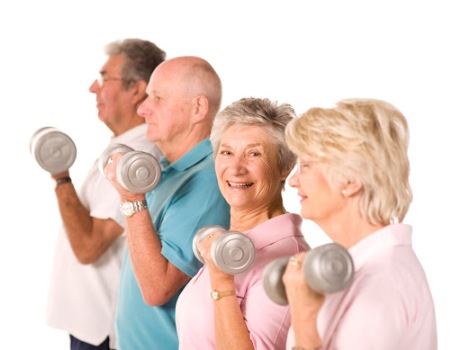
Older People Don't Need Weightlifting Exercises
Older people need it more than anyone else. Look at the facts: older people suffer from decreased mobility, brittle bones, joint pain, and in some cases feelings of depression and disorientation caused by having few goals after retirement. Weightlifting can help with brittle bones. It can also ease joint pain by strengthening the muscles that surround and support the joint. Gradually, mobility improves, along with strength. And while for some it's a chore, for others weightlifting may become a genuinely enjoyable hobby. It could also add years to your life. How? Because of its cardiovascular benefits? Yes, partly. Because of its social, goal-oriented nature, helping you stay mentally healthy and engaged? There is that. But recent studies indicate that intense exercise can increase neuroplasticity. Neuroplasticity means that your brain changes shape, physically, the way a child or teenager's does, as it absorbs new information and makes new connections. Intense exercise makes your brain younger. Of course, a training routine for a 70-year-old woman shouldn't be the same as that for a male college student; but they can use a lot of the same tools to achieve their goals.

Weightlifting Can Stunt Your Growth
This is a myth, pure and simple. When you're young, the growth plates in your bones are still open and they are vulnerable to injury. Very heavy training of any sort isn't advisable until these plates have closed, which will usually happen between the ages of 12 and 16 in females and 14-18 in males. But weightlifting needn't involve very heavy training; if you build up to it slowly and learn to do it well, there's no reason why you shouldn't be putting your bodyweight overhead with no ill effects, even in your teens. Weightlifting does carry a risk of injury for children and teenagers, though it's easily avoided. But it doesn't stunt your growth. The number one indicator for your height is your parents' height, and the number two indicator is your diet. If you eat well and have tall parents, you'll probably be around their height. If that happens, you'll have longer limbs, with longer muscles that don't look as 'bunched' and you'll appear slimmer even if you have an athletic physique. You might not look like you lift through your street clothes. If you're shorter, you'll probably look more conspicuously muscular, so people might think you got...
This is a myth, pure and simple. When you're young, the growth plates in your bones are still open and they are vulnerable to injury. Very heavy training of any sort isn't advisable until these plates have closed, which will usually happen between the ages of 12 and 16 in females and 14-18 in males. But weightlifting needn't involve very heavy training; if you build up to it slowly and learn to do it well, there's no reason why you shouldn't be putting your bodyweight overhead with no ill effects, even in your teens. Weightlifting does carry a risk of injury for children and teenagers, though it's easily avoided. But it doesn't stunt your growth. The number one indicator for your height is your parents' height, and the number two indicator is your diet. If you eat well and have tall parents, you'll probably be around their height. If that happens, you'll have longer limbs, with longer muscles that don't look as 'bunched' and you'll appear slimmer even if you have an athletic physique. You might not look like you lift through your street clothes. If you're shorter, you'll probably look more conspicuously muscular, so people might think you got short from training. If anything, training will help you to reach your genetic potential for height by increasing your output of Human Growth Hormone (HGH). It certainly won't make you shorter.
- Important notification about information and brand names used in this slideshow!
- Photo courtesy of PanARMENIAN photo by Flickr : www.flickr.com/photos/panarmenian_photo/5511929250/
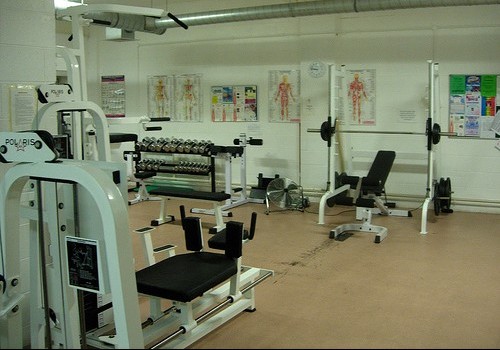
Machines Are More Effective Than Free Weights
Effective for what? If your goal is strength, or hypertrophy, or even general fitness, then heavy free weights are hard to beat. There are three reasons for that. One is that when you lift a barbell, you don't just have to lift it: you have to stabilize it too. In the barbell overhead press, the whole body is involved, either to help drive the bar overhead or to maintain the stability of your own body as you do it. Machines take out this stability requirement, and small stabilizing muscles don't get the conditioning they need. The second reason is that your body will move slightly differently to the next person's. We're all variations on a theme, with slightly different physiques. That means the right path for the bar to take in your bent row might not be the right path for it to take in mine. If you use free weights, you have room to move the way you need to move. Machines put everyone through the same pattern, even if it's not right for you. The third reason is that machines tend towards isolating body parts. There's a machine for your chest, a machine for your biceps, a machine...
Effective for what? If your goal is strength, or hypertrophy, or even general fitness, then heavy free weights are hard to beat. There are three reasons for that. One is that when you lift a barbell, you don't just have to lift it: you have to stabilize it too. In the barbell overhead press, the whole body is involved, either to help drive the bar overhead or to maintain the stability of your own body as you do it. Machines take out this stability requirement, and small stabilizing muscles don't get the conditioning they need. The second reason is that your body will move slightly differently to the next person's. We're all variations on a theme, with slightly different physiques. That means the right path for the bar to take in your bent row might not be the right path for it to take in mine. If you use free weights, you have room to move the way you need to move. Machines put everyone through the same pattern, even if it's not right for you. The third reason is that machines tend towards isolating body parts. There's a machine for your chest, a machine for your biceps, a machine for your triceps. If you power clean a heavy barbell, is that a lift for your legs, your back, or your arms? The answer is, no: it's a lift for your legs and your back and your arms. Big, compound movements involving many joints lifting a large load are proven strength and mass builders that also teach you how to move in the real world, an effect you won't get on the pec deck. Machines aren't useless: use them to get over a sticking point, to recover from an injury or for exhaustion training. But if you make them the basis of your training you're missing out.
- Important notification about information and brand names used in this slideshow!
- Photo courtesy of Killer Biscuit by Flickr : www.flickr.com/photos/thekillerbiscuit/49593707/
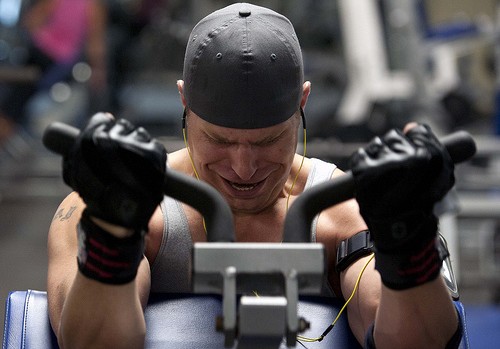
Lifting Weights Will Cause Damage To Your Joints
You may as well say driving will make you crash your car. Weightlifting doesn't damage your joints: lifting wrong damages your joints. Too many people, especially guys, jump in at the deep end with a plan they copied from a magazine (or a know-nothing friend who likes to brag). They lift too heavy before they can lift right. They move wrong and don't even know it. They go into a 2-hour training session from a standing start, not knowing how to warm up, how to stretch, how to look after their soft tissue. They don't know how to program properly so they do five bench press variations and some curls and go home, neglecting their backs and legs in the quest for sleeve-ripping guns. Is it any surprise these guys get hurt? It's like taking your first driving lesson in a big rig, without an instructor. If you're new to weightlifting, treat the first few months as an investment. Learn to move right. Get someone trustworthy and competent to teach you the lifts, and treat them as practice for a while before you start throwing plates on the bar. Learn about nutrition and about taking care of yourself. You can't...
You may as well say driving will make you crash your car. Weightlifting doesn't damage your joints: lifting wrong damages your joints. Too many people, especially guys, jump in at the deep end with a plan they copied from a magazine (or a know-nothing friend who likes to brag). They lift too heavy before they can lift right. They move wrong and don't even know it. They go into a 2-hour training session from a standing start, not knowing how to warm up, how to stretch, how to look after their soft tissue. They don't know how to program properly so they do five bench press variations and some curls and go home, neglecting their backs and legs in the quest for sleeve-ripping guns. Is it any surprise these guys get hurt? It's like taking your first driving lesson in a big rig, without an instructor. If you're new to weightlifting, treat the first few months as an investment. Learn to move right. Get someone trustworthy and competent to teach you the lifts, and treat them as practice for a while before you start throwing plates on the bar. Learn about nutrition and about taking care of yourself. You can't train if you're injured!
- Important notification about information and brand names used in this slideshow!
- Photo courtesy of Joint Base PHH by Flickr : www.flickr.com/photos/jointbasepearlharborhickam/5553675877/

Cardio Is Enough For Weight Loss - You Don't Need Weight Training
For many people, their sole goal in going to the gym is weight loss. And there's a common misconception that weight loss is all about cardio. Trouble is, it's anything but. First things first: most respectable fitness professionals will talk about 'fat loss' or 'body composition change' rather that 'weight loss.' Because, after all, you don't want to weigh less, you want to be slimmer. When you look the way you want to look, you might even weigh MORE. Huh? Running on a treadmill will empty your muscles' glycogen reserves, eventually. Then the liver will contribute its glycogen stores and then anything yo may have eaten recently will be strip-mined for glucose to fire the muscles. Finally, your body will begin to consume its own tissues. Including muscle. This process is called 'catabolysis' and it's the bane of bodybuilders' lives. When they're 'cutting' body fat to show of their physiques, these figure athletes know they're also losing precious muscle. So they continue to lift heavy, telling their bodies the muscle is needed more than the fat. If you want a lean, healthy physique, the chances are that you'd like to lose some fat and keep the muscle you have or...
For many people, their sole goal in going to the gym is weight loss. And there's a common misconception that weight loss is all about cardio. Trouble is, it's anything but. First things first: most respectable fitness professionals will talk about 'fat loss' or 'body composition change' rather that 'weight loss.' Because, after all, you don't want to weigh less, you want to be slimmer. When you look the way you want to look, you might even weigh MORE. Huh? Running on a treadmill will empty your muscles' glycogen reserves, eventually. Then the liver will contribute its glycogen stores and then anything yo may have eaten recently will be strip-mined for glucose to fire the muscles. Finally, your body will begin to consume its own tissues. Including muscle. This process is called 'catabolysis' and it's the bane of bodybuilders' lives. When they're 'cutting' body fat to show of their physiques, these figure athletes know they're also losing precious muscle. So they continue to lift heavy, telling their bodies the muscle is needed more than the fat. If you want a lean, healthy physique, the chances are that you'd like to lose some fat and keep the muscle you have or even gain some. Intense exercise is more effective in shifting fat, too. And lifting weights will provide that. You'll also get the benefits of a speeded-up metabolism that comes with training properly with weights. It's a win-win that you can't get jogging on a treadmill for hours.
- Important notification about information and brand names used in this slideshow!
- Photo courtesy of Port of San Diego by Flickr : www.flickr.com/photos/portofsandiego/7244592000/
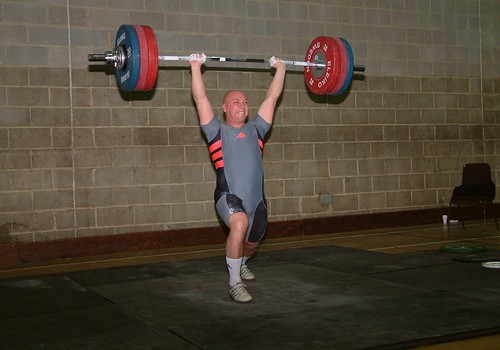
Weightlifting Won't Help Me Lose Weight
Weightlifting is key to most people's weight loss. Lifting heavy will help increase your resting metabolic rate, meaning you consume more calories even when you're not training. Intense training will make your body consume more oxygen and more calories as it recovers for hours after the session. You'll need more calories yet to rebuild the muscles that get stressed during training. And as your glycogen reserves get built up, your blood sugar will stabilize and you won't have the sudden munchies any more. Weightlifting can also be fun, an opportunity to set goals and bust through them or even, when you learn a few moves you like or feel confident doing, a pleasure in its own right. Anything that makes training pleasurable is going to help you stick at it when the day's been hard and the bar or the TV is calling. In fact, I'd say weightlifting is key to losing weight.
- Important notification about information and brand names used in this slideshow!
- Photo courtesy of Paul Furness by Flickr : www.flickr.com/photos/tattoedmillionaire58/4120608256/
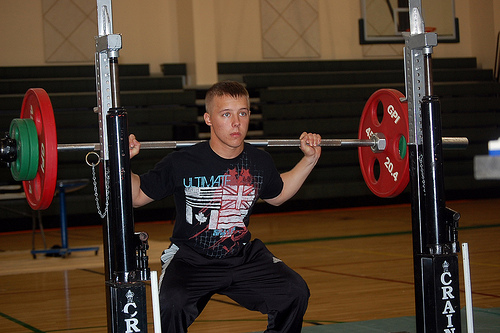
More Reps Is Always Better - Push Another One Out!
Many of us learned to lift this way, and at first glance it makes sense. If twenty pushups is good, thirty must be better, right? Well, kind of. Lifting in different 'rep ranges' does different things to your body. If you squat a weight for thirty reps, you're using energy and improving endurance but you're probably not getting either the strength or the metabolic effects you could get in lower rep ranges. For men, typically, between one and three reps will build maximal strength but not much size, while between three and six will give some of both. Five to eight will give a little more size as compared to strength and eight up to between 12 and 20 is really about size and endurance. Different body parts will respond differently too. Legs can be loaded with more reps before fatigue, so higher numbers of squats, say, is equivalent to lower numbers of pressing or rowing exercises. Women typically need a couple of extra reps in each range compared to men, because they can't activate as many motor units as men, though it depends on the athlete.
- Important notification about information and brand names used in this slideshow!
- Photo courtesy of USAG- Humphreys by Flickr : www.flickr.com/photos/usaghumphreys/5082661290/

Lifting Weights Causes Increased Blood Pressure
Lifting weights is more likely to lower your blood pressure than to raise it. Your cardiovascular system gets assistance from skeletal muscle to pump your blood round your body. More muscle is likely to help rather than hinder this. Intense exercise tends to cause increases in heart muscle and artery wall strength that will result in lower blood pressure and a lower resting pulse. And lifting heavy can be a form of cardio all by itself, as anyone who's ever staggered purple-faced out of the squat rack can attest. The myth that lifting weights increases blood pressure probably comes from the same source as the old 'musclebound' myth - that people could be so muscular it impeded their movements. Decades of careful study have conclusively shown that this is totally false. So is the idea that weightlifting increases blood pressure. But it does cause a blood pressure spike when you're actually doing it, so people with heart conditions might want to proceed with caution, despite the long-term benefits.
- Important notification about information and brand names used in this slideshow!
- Photo courtesy of Jesse K. Alwin, U.S. Marine Corps by Wikimedia Commons : commons.wikimedia.org/wiki/File:Blood_pressure_measurement.jpg


_f_280x120.jpg)

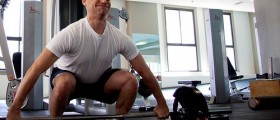
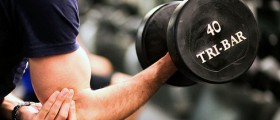

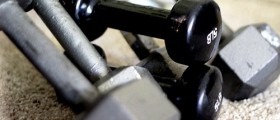
_f_280x120.jpg)
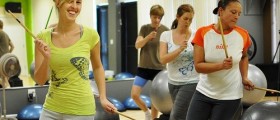
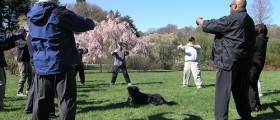
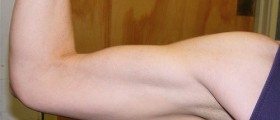
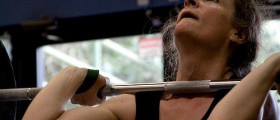


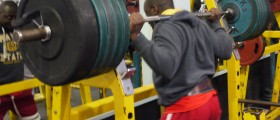
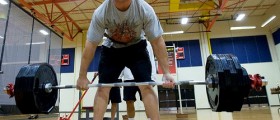
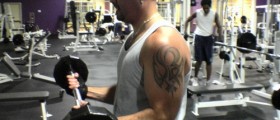
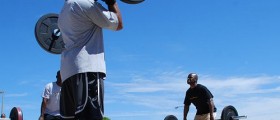

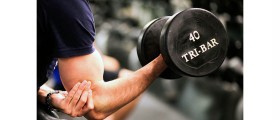




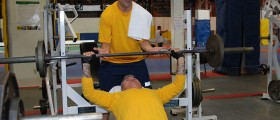
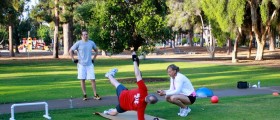
Your thoughts on this
Loading...